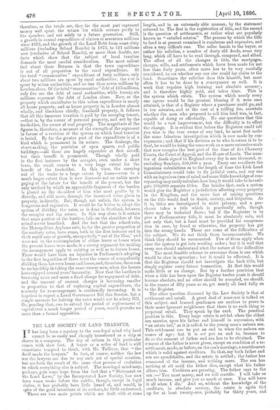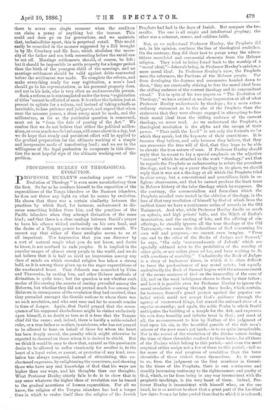THE LAW SOCIETY ON LAND TRANSFER.
IT has long been a mystery to the non-legal mind why land cannot be as easily and cheaply transferred as a ship or shares in a company. The day of reform in this particular comes with slow foot. A buyer or a seller of land is still sometimes tempted to think, with Mr. Tolliver, that "the devil made the lawyers." In fact, of course; neither the law nor the lawyers are due to any such act of special creation, but are both the result of the same slow process of evolution to which everything else is subject. The non-legal mind may, perhaps gain some hope from the fact that a "Statement on the Land Laws," by the Incorporated Law Society, has now been some weeks before the public, though, except in legal circles, it has probably been little heard of, and would, in spite of the good intentions of its authors, be little understood.
There are two main points which are dealt with at some length, and in an extremely able manner, by the statement referred to. The first is the registration of title, and the second is the question of settlements, or rather what are popularly known as "entailed estates." The process by which the title to land is at present examined is cumbrous and expensive, and often a very difficult one. The seller hands to the buyer, or rather his solicitor, a number of dusty old deeds, some very long, which all have to be read through, compared, and sifted. The effect of all the changes in title, the mortgages, charges, wills, and settlements which have been made for not less than forty years, often more, has to be very carefully considered, to see whether any one else could lay claim to the land. Sometimes the solicitor does this himself, but most often it has to be done by a conveyancer as well. It is work that requires high training and absolute accuraer-, and is therefore highly paid, and takes time. This is the system which exists. The system which nearly every one agrees would be the greatest blessing if it were once attained, is that of a Register where a purchaser could go, and in ten minutes, and at the cost of a trifling fee, ascertain whether the man who proposed to sell him land was, in fact, capable of doing so effectually. No one questions that this would be a vast improvement, but the difficulty is to effect the change. It is evident that before the Registrar could tell you who is the true owner of any land, he must first make the same laborious investigation which is now made by con- veyancers; and that if his decision as to who is owner is to be final, he would be doing the same work on a more extensive scale that now occupies the best part of the time of five Chancery Courts, the Court of Appeal, and the House of Lords. The num- ber of deeds signed in England every day is one thousand, or, excluding Sundays, 300,000 a year. Every one recollects the ingenious calculations as to the length of time the Irish Land Commissioners would take to fix judicial rents, and any one with an ingenious turn of mind and some little knowledge of con- veyancing may easily calculate how long it would take to investi- gate 300,000 separate titles. But besides that, such a system would give the Registrar a jurisdiction affecting every property in the Kingdom, and the mere fact of raising questions on the title would lead to doubt, anxiety, and litigation. As it is, titles are investigated in strict privacy, and a pur- chaser takes a title which is practically safe, though there may be technical flaws ; but if the Registrar is to give a Parliamentary title, it must be absolutely safe, and not only that, but a fund must be provided for compensa- tion in case, by fraud or otherwise, the property has got into the wrong hands. These are some of the difficulties of the subject. We do not think them insurmountable. We think they should be surmounted. Few of them apply when once the system is got into working order ; but it is well that every one should understand what the nature of the difficulties is. The most feasible scheme to overcome them is one which would be slow in operation ; but it would be effectual. It is that the Registrar should not investigate the back title, but simply register every future transaction. At first this would make little or no change. But by a further provision that when a title has been upon the Register twelve years it should become absolute, and no other should be accepted, we should, in the course of fifty years or so, get nearly all land fully on to the Register.
The other question discussed by the Law Society is that of settlement and entail. A great deal of nonsense is talked on this subject, and learned gentlemen are anxious to prove to their more ignorant neighbours that there is no such thing as perpetual entail. They speak by the card. The practical position is this. Every large estate is settled, when the eldest son marries, upon his father and himself in succession, with "an estate tail," as it is called, to the young man's unborn son. This settlement can be put an end to when the unborn son comes of age ; but it is not put an end to, because to do so the consent of father and son has to be obtained. The consent of the father is never given, except on condition of a re- settlement, made, as before, on the son's marriage, a resettlement which is valid against creditors. So that, say both father and son are spendthrifts, and the estate is settled ; the father has command of the income, and nothing more. The son has nothing at all until the father dies, except what his father allows him. Creditors are pressing. The father says to the son :—.4 You must marry, and we will resettle. I will take so much income, and give you so much at once. You will have it all when I die.' And so, without the knowledge of the creditors, in absolute secrecy, the estate is again tied up for at least twenty-one, probably for thirty years, and
there is never one single moment when the creditors can claim a penny of anything but the income. This could and does go on for generations, and we maintain that, technicalities apart, this is perpetual entail. This could easily be remedied in the manner suggested by a Bill brought in by Mr. Courtney and Mr. Ice, which abolishes the neces- sity of the father and son both consenting before the entail can be cut off. Marriage settlements should, of course, be left ; but it should be impossible to settle property for a longer period than the birth of the youngest child of the marriage, and no marriage settlement should be valid against debts contracted before the settlement was made. To complete the reform, and make everything ready for easy registration, a man's land should go to his representatives, as his personal property does, and not to his heir, who is very often an undiscoverable person.
Such a reform as is contemplated under the term "registration of titles "cannot be effected at once. It is rather the fashion just at present to agitate for a reform, and instead of taking rebuffs as inevitable, to lose patience and judgment, and expect that when once the measure passes, a clean sweep must be made, and the millennium, as far as the particular question is concerned, must set in "from the date of passing of the Act." We confess that we do not believe that either the political millen- nium, or even much-needed reforms, will come about in a day, but we do hope that steady and persistent effort will be applied to the gradual preparation for the ultimate working of a simple and inexpensive mode of transferring land ; and we see in the willingness of the legal profession to co-operate in this direc- tion the most hopeful sign of the ultimate working-out of the problem.



































 Previous page
Previous page